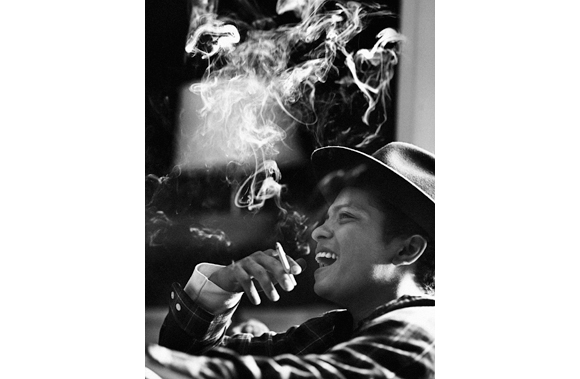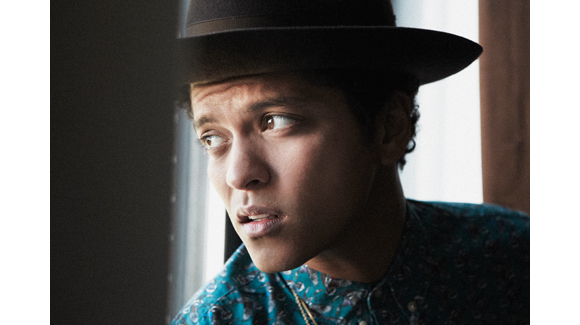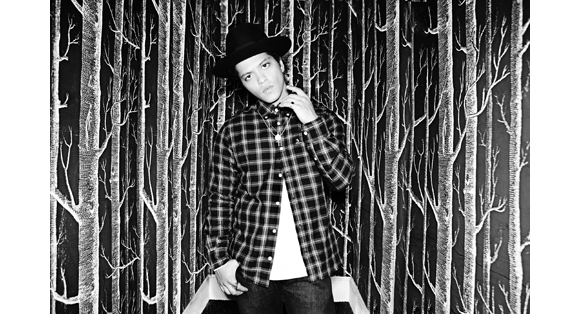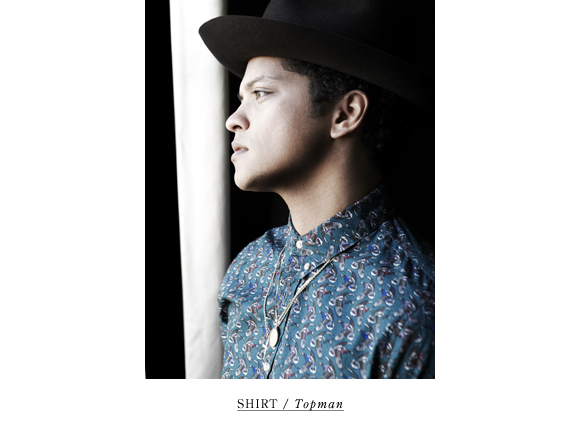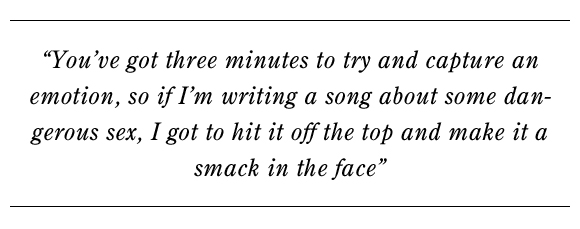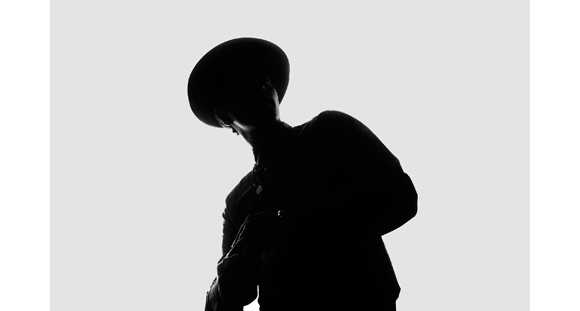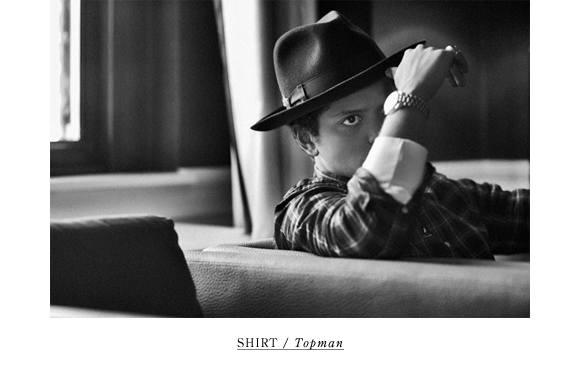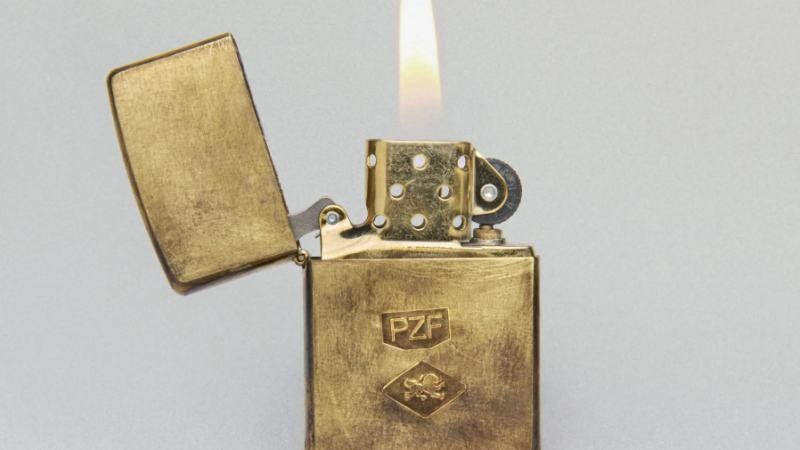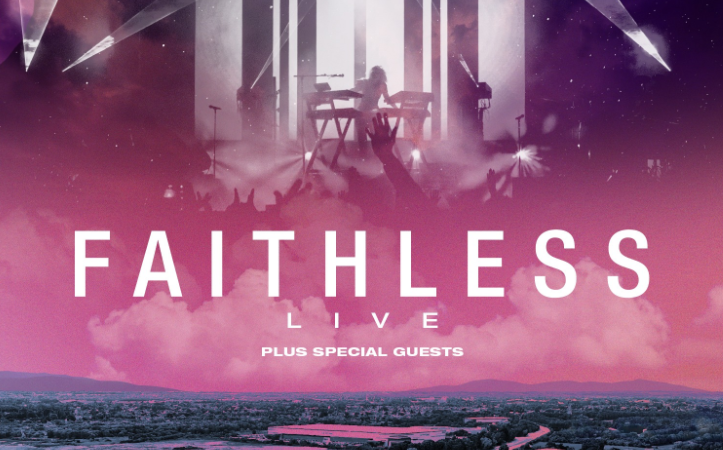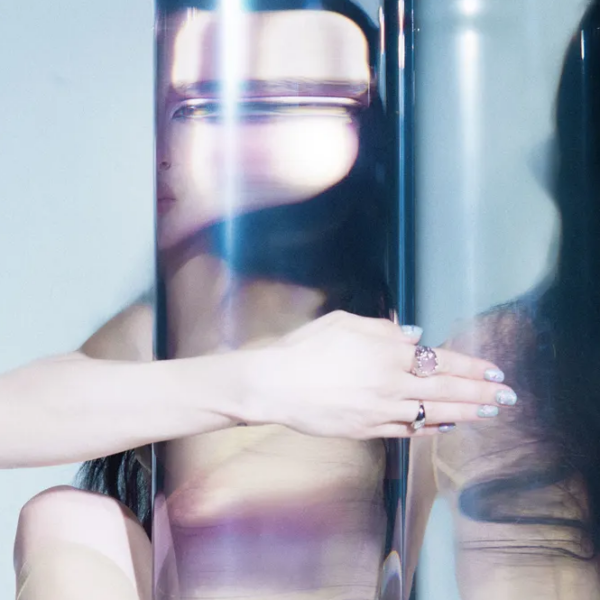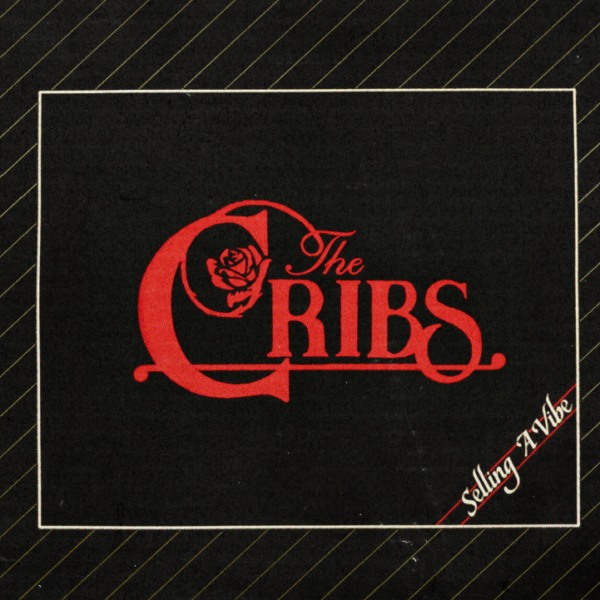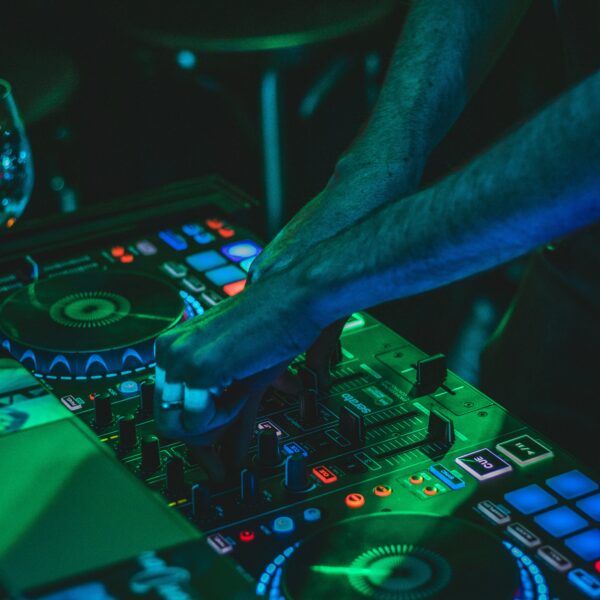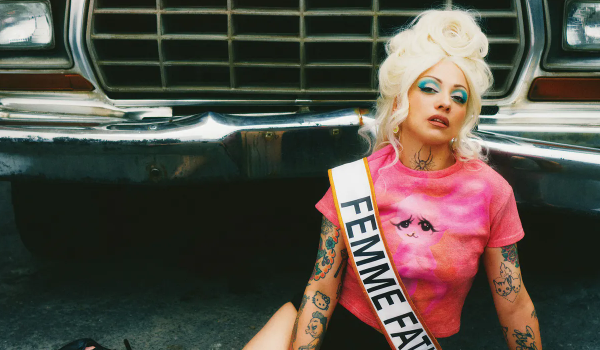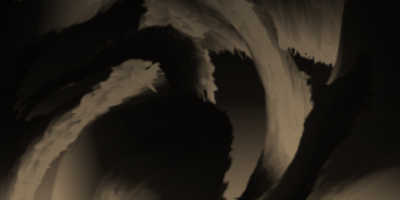MICHAEL CRAGG meets Bruno Mars in a New York hotel on the verge of releasing his new album Unorthodox Jukebox, a record of pop hooks that positions him as a modern entertainer in the classic tradition…
There are a couple of ways to test how good a popstar someone is. One of them involves complex things like their songs, their personality, their stage presence, how difficult or easy they make it all look etc, while the other involves the simple hat. Michael Jackson could pull off a hat. Lady Gaga can pull off a hat and hers usually involve lobsters and telephones or what look like vases from IKEA. It works because they can transcend the hat; their popstar personality shines through from beneath the brim. Olly Murs, however, cannot transcend the hat. Olly Murs is and always will be a twat in a hat. Perched on the inside window ledge of the fourth floor of a swanky New York hotel, window open and smoke unfurling into the crisp afternoon air, Bruno Mars thankfully knows how to work a hat.
Perhaps unfairly, for many, Bruno’s hat is the most interesting thing about him. For some, Bruno Mars writes drippy, easy to dismiss love songs such as Just The Way You Are and Grenade that Magic FM and people who only buy albums in Tesco love. For them, it’s easy to ignore the eleven Grammy nominations, the four UK Number One singles and the six million sales of his debut album, Doo-Wop & Hooligans. It can be easy to dismiss all this because Bruno isn’t and probably never will be “cool”. “You’re saying I’m not cool? Is that what you’re saying?” he jokingly (or at least I think he’s joking) snaps once he’s settled on a sofa, cigarette extinguished. “Who is saying to you that I’m not cool?”. But you have a sense of how you’re perceived by the so-called ‘tastemakers’ don’t you, I splutter back. I cite the time Odd Future fool Tyler, The Creator claimed in a song that he’d quite like to slit Bruno’s throat, to which Mars replied that he would need to join the back of a very long queue. “Look man, the world is full of fucking dorks, you know what I mean,” he sighs. “It’s a guy singing love songs. Go get a job and do something with your life.”
Bruno Mars is not your typical 2012 popstar. Born Peter Hernandez (his dad called him Bruno after the wrestler Bruno Sammartino) in Hawaii in 1985 to a family of performers, he made his stage debut at his parents’ Las Vegas-style shows as an Elvis impersonator when he was just three-years-old. While his five siblings avoided the spotlight, Bruno didn’t have any qualms about showing off. “I guess that I’m the attention whore that wanted to get on stage and my dad pulled me up there one night and that was it,” he remembers. “My dad was such a music buff and there was always a lot of music around; a lot of Elvis, a lot of 1950s rock n roll and doo-wop of course and I was just so infatuated with it, so I saw girls screaming for Elvis and I remember thinking, ‘I want some of that’.”
Unlike say Jessie J or Lady Gaga, there are no grand proclamations of being a figurehead for some new self-help movement or any notion of giving a voice to the voiceless. When he talks about social media – a hugely important mark of success in today’s pop landscape of dwindling album sales – he amusingly refers to Twitter as “the Twitter” and Facebook as “the Facebook” and even the internet is introduced with a stuttering “…because of the age we’re in, with, what do you call it, the internet.” In fact, trying to eke out any over-arching statement as to why he wanted to become a singer rightly never gets much further than the truth: to entertain as many people as possible.
“I mean, I just wanted to sing man,” he shrugs, clearly a bit uncomfortable about having to justify it all. “That’s it. I sing and I write songs.” I tell him it’s pretty refreshing to hear that after all the heavy-handed statements about righting the world’s wrongs through the medium of song. “I feel like it’s all I know what to do, thanks to my parents. I’ve been doing this for so long, being in music, so there’s no plan B for me. If I wasn’t making albums and talking to you I might be in a restaurant singing somewhere, but it would be something involved in music.”
But, like a lot of today’s biggest popstars, success hasn’t come easy and was achieved via the increasingly well-travelled ‘songwriting for other people’ route. When he was 18, Bruno left the safe haven of Hawaii to live in LA after he signed a deal with Motown. It’s there that he wrote his first song, through necessity rather than inspiration. “It’s not like the movies where you just get signed and all of a sudden you start selling albums and you’re touring the world,” he states. “The reality hit of, like – you got to do this shit on your own and if you want to be taken serious as an artist the best thing to do is write your own music and basically present it as ‘this is what I am, take it or leave it’.” Unfortunately, a lot of people decided to leave it and Mars was dropped. Suddenly he was in the position of trying to sell himself as an artist via writing songs for other people, which makes life quite complicated. “I was flat broke and as much as it hurt me to think about selling the songs I worked so hard for, that was the only way for me to stay afloat and live in LA. So I had to just swallow that and accept that for me to stay up here I have to become a producer because you can get me for cheap and they’ll take the song. I was just hoping that one day someone was going to take a chance on me, on the guy writing.” It’s not like you can’t sing, I offer unhelpfully. “It’s so confusing because you’re like ‘but I wrote this and I’m playing the instruments on this and you hear me singing, you obviously like it’, so it was hard for me to understand why they wouldn’t take a chance on me actually.”
One positive that came out of the Motown debacle was the formation of Mars’ songwriting and production team, The Smeezingtons. Alongside Mars, producer Philip Lawrence and engineer Ari Levine, have written and produced hits for the likes of Cee Lo Green (the ubiquitous Fuck You), rapper B.o.B (the US Number One Nothin’ On You) and Travie McCoy (Billionaire), as well as the odd dud, specifically in the shape of Sugababes’ Get Sexy, a song which sort of signalled their demise. “Oh, is that my fault?” he splutters. “Are you blaming me for the demise of the Sugababes? No, that was fun. That was…We don’t do dance music. We just, erm, we tried. Sorry.” Missteps aside, thanks to features on Nothin’ On You and Billionaire, Bruno was now being played on the radio (a lot) and the release of his debut solo single, Just The Way You Are, propelled him into the big league. After years of waiting, he’d finally been given the chance and no one was going to let that pass them by. Talking about his patchy debut album Doo-Wop & Hooligans now, it’s clear that he’s not 100% happy with how it turned out: “It was slightly rushed. With the success of Nothin’ On You and Billionaire, you know, at the end of the day this is a business and they wanted to capitalise on the success of those songs. So they put out Just The Way You Are and all of a sudden it blows up and they’re like ‘OK, finish your album’ and so I had to.”
One thing Unorthodox Jukebox, his new album, doesn’t sound is rushed. Helmed by The Smeezingtons, with songwriting and production input from the likes of Paul Epworth, Diplo, Benny Blanco, Mark Ronson, Jeff Bhasker (Alicia Keys, Kanye West), Emile Haynie (Eminem, Lana Del Rey), it’s an album that bristles with confidence. “I’ve always wanted to work with [these people] and now that I’ve got a bit of a name for myself it’s a little easier to make those phone calls,” he laughs. “That was the coolest part of it all, that I had these awesome producers that have all had the big old hits and have been working on some big albums and I got these guys to get in a room and we duked it out on a lot of different things. That’s the best part of making this album.”
While his debut matched obvious songwriting talent with the likes of the inexcusable The Lazy Song, Unorthodox Jukebox (so-named “because it’s me experimenting with my voice, with the guitar, with the sound, with different producers”), feels like a popstar hitting their stride. While the first single Locked Out Of Heaven takes what sounds like an unreleased Police song and bolts on a typically sky-scraping Mars chorus, and there are still nods to Michael Jackson (especially on the Off The Wall-esque, Treasure) littered throughout, the album also takes unexpected turns into gauzy, minimal, almost Prince-like R&B on the raunchy Gorilla (sample lyric: “you’ll be banging on my chest like a gorilla”) and references Kanye’s classic 808s & Heartbreaks album on the pulsating, Epworth-assisted, Natalie. “I always want to constantly evolve and change my sound up,” he explains. “I’m hoping that the glue is always my voice and people will say ‘that’s a Bruno Mars song’.”
While musically the songs have evolved, the lyrics still tend to deal with broad emotions, with most of the women characterised as harlots who love and run. For Mars, this is all part of what makes his songwriting so accessible. “I look at songwriting like writing a movie,” he explains, “except I don’t have three hours to explain the stories and build characters and let people know that this is a nice guy and this is a bad guy, you know. You’ve got three minutes to try and capture an emotion, so if I’m writing a song about some dangerous sex, I got to hit it off the top and make it a smack in the face. I’m just writing and writing and writing songs and trying to impress myself and keep my attention span. Re-writing this shit over and over because I’m not satisfied with it.”
Writing massive global hits is, contrary to what you might hear elsewhere, not an easy thing to do and nor is appealing to millions of people in some way a sign of taking the easy route. I ask Bruno if he thinks he gets the credit he deserves for writing songs that shitloads of people like. “The truth is that it’s one of the hardest things to do, to write a love song, because you’re competing with billions of other love songs, so what makes your love song so special?” he says slowly, sounding as pissed off as a man from Hawaii can get. “You know, you’re singing about what everyone’s singing about and that’s what people want to hear. That’s what I want to sing about and that’s what music is; it’s supposed to be about that emotion.” Well, that and a good hat.
WORDS / Michael Cragg
PHOTOGRAPHER / James Moriarty
ART DIRECTION / Hidden Agency
STYLIST / Alexis Knox
HAIR / James Mooney using Moroccan Oil
GROOMING / Naomi Pajan

